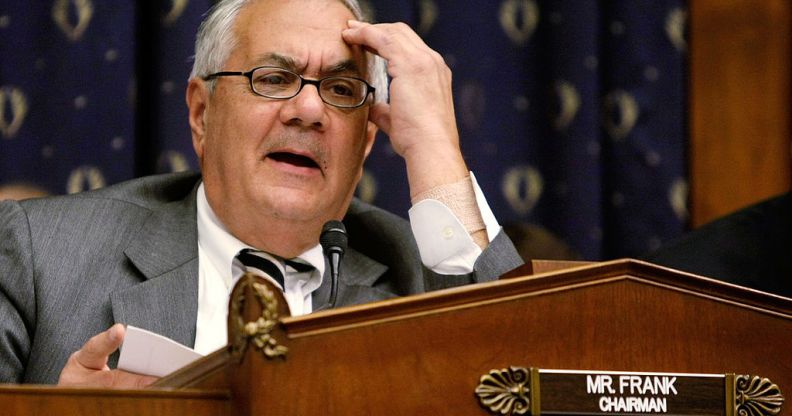We’re still 20 years away from seeing an openly LGBT+ president in the White House, claims trailblazing gay congressman

Barney Frank (Alex Wong/Getty)
Barney Frank, the first gay congressman in the United States, thinks the country is 20 years away from electing an openly LGBT+ president.
The former congressman and civil rights campaigner told Reuters that attitudes towards the LGBT+ community have changed “significantly” since he was first elected to Congress as a closeted gay man in 1981.
Frank, who came out in 1987, said that LGBT+ equality is closer than ever before – but he still doesn’t think a queer person will be in the oval office for another 20 years.
“The country has made it very clear – full legal equality wins and prejudice loses,” the 80-year-old said.
“I believe the fight for LGBT+ rights has been won (in the United States).”
Trans rights are still lagging behind, first gay congressman Barney Frank said.
The Democrat noted that some progress has even been made during the presidency of Donald Trump, referring to the US Supreme Court’s ruling that banned workplace discrimination against LGBT+ people.
However, trans rights are lagging behind, he admitted, referring specifically to Trump’s much maligned trans military ban, which he announced in a series of tweets in 2017.
“[Joe] Biden is committed to getting rid of the trans ban in the military – and the Republicans won’t defend it,” Frank said.
The pioneering gay politician retired from Congress in 2013 after a long and storied career.
His retirement came just six months after he married his partner Jim Ready in a ceremony in Massachusetts, making him the first sitting member of Congress to have a same-sex wedding.
Speaking at the time, he said: “I think it’s important that my colleagues interact with a married gay man.”
The gay lawmaker has occasionally courted controversy.
The gay rights advocate has been vocal in his calls for equality throughout his political career – but he has occasionally courted controversy.
In 2015, he called for closeted gay lawmakers who vote against LGBT+ rights to be “exposed”.
“Anyone who is gay and votes in an anti-gay fashion has, it seems to me, lost their right to privacy, because it’s been converted to a right of hypocrisy,” he said at the time.
In 2014, he came under fire when he bizarrely claimed that trans people don’t have equal rights because they wouldn’t help lobby for it.
“The transgender community had this mistaken view [in 2007] that if Nancy Pelosi waved a magician’s wand, transgender would be included. And we were insisting to them that, look, we don’t have the votes, help us lobby.”
He went on to suggest that trans people had refused to help lobby for change, stirring controversy within the LGBT+ community in the process.

